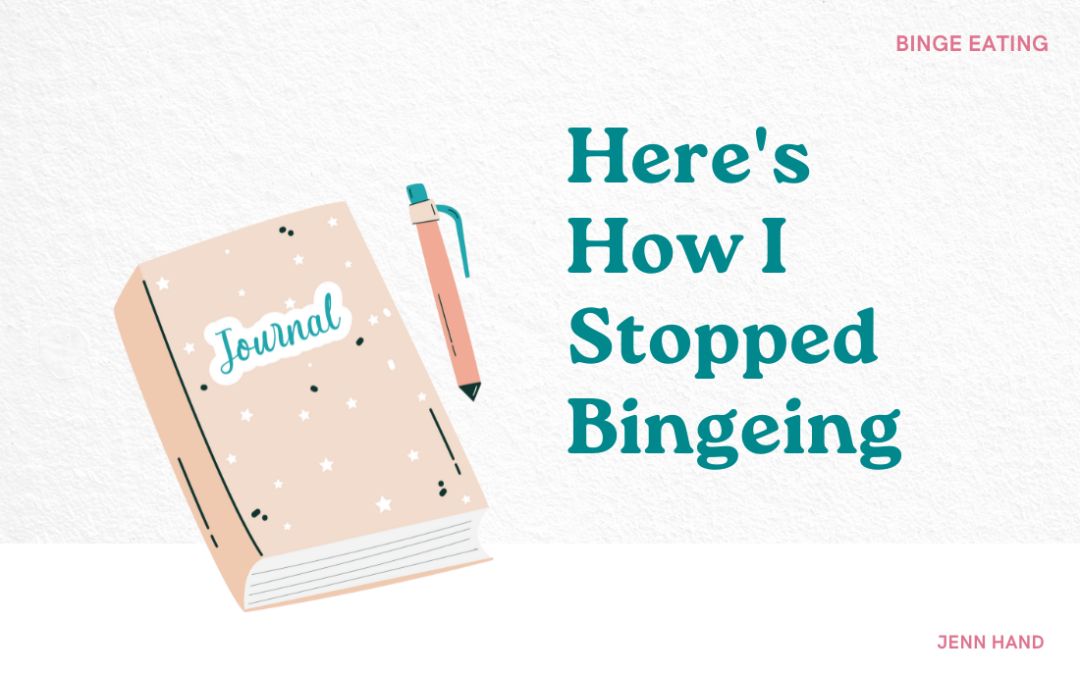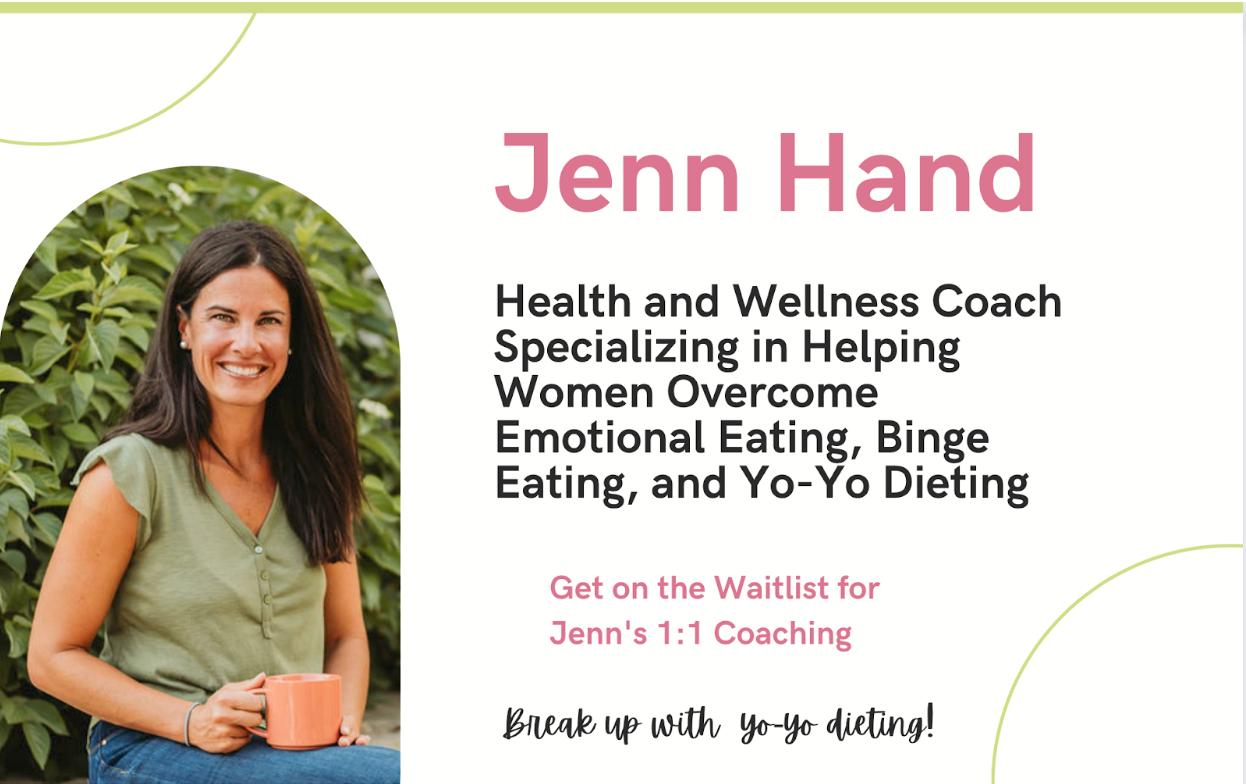Written by Jenn Hand, Holistic Nutritionist, Board Certified Health Coach, NBC-HWC, Binge Eating Coach
I stopped binge eating. And you can too.
As I began to heal my food issues over the years, I stopped binge eating. I wanted to share what I’d learned with other women, so I became a nutritionist and health coach. I knew that other women could learn how to stop binge eating too. And I was right. 🙂 I’ve been coaching women for nearly 10 years! So I know for a fact that if I can do it and my clients can do it, well, so can you! Let’s start with my story, and then I’ll share some tips on how you can stop binge eating. So, let’s get into it!
When I was in the throes of dieting and bingeing, I remember sobbing in endless frustration and despair over not being able to stop eating.
I was 26 and had just broken up with my boyfriend of almost four years. Although I knew it was for the best, I was still heartbroken.
I’d been through years of healing on this journey but still couldn’t resist the pull towards cookies and Reese’s to soothe my aching heart.
If you had told me then I’d one day be “done” bingeing, I wouldn’t have believed you. But fast forward to today and here I am.
TABLE OF CONTENTS:
- I Stopped Binge Eating Here’s How I Did It
- I Ate According to the Clock to Help Me Stabilize My Blood Sugar
- I Began Chipping Away at the Old Diet Tapes
- I Worked to Not Eat Over Every Emotion
- I Identified My Triggers & Made a Plan for Them
- I Chipped Away at the All-or-Nothing Mindset
- We Identified the Following Patterns
- Simultaneously, We Dove Into the Balance of Allowing vs Structure
- You Can Stop Binge Eating For Good
- How Intuitive Eating Can Help You Stop Overeating
- How Do I Know If I Have a Serious Eating Disorder?
- Common Questions
If you’re feeling stuck, frustrated, angry at yourself for not being able to “just stop eating”, I get it.
This path is mind numbingly frustrating at times, as it feels like it should be easy to do what we know we should: just stop eating. But if you’re reading this, then there is a part of you that still believes, you CAN stop bingeing.
Hold on to that quiet whisper inside–that is what kept me going when I had my darkest moments of wanting to give up.
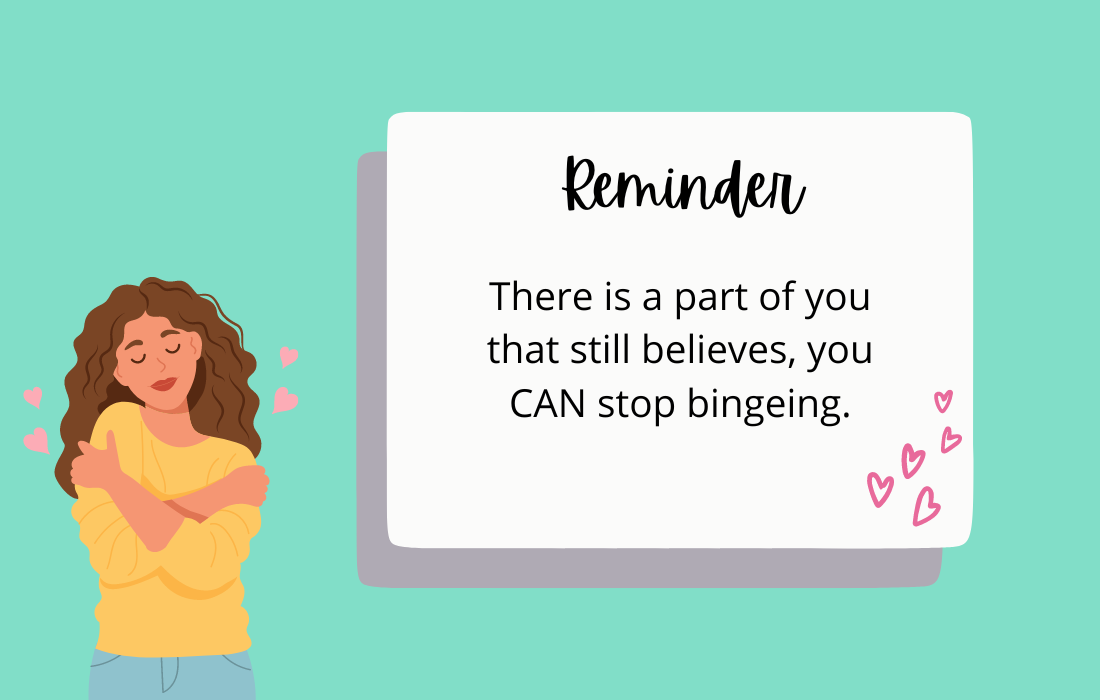
I stopped binge eating. Here’s how I did it.
If you prefer to listen at the podcast, do so here:
1. I Ate According to the Clock To Help Me Stabilize my Blood Sugar.
This might sound counterintuitive, as we’re “supposed” to be in touch with hunger and fullness and eat according to that.
The problem is that when we first start, we are so far from hearing our body’s signals that don’t know how. So I used the clock to guide me. (BTW–there is more on this in the first two chapters of my book: How to Be a Normal Eater) I began eating every 3 hours, like clockwork. It was terrifying.
But it also felt good to have something to guide me–I wasn’t left to my own whims of hunger/fullness.
Every 3 hours, I would eat. My meals were small, as I was still in the diet mindset, but I worked to let my body normalize her rhythms. This is a crucial step, as it worked to stabilize my blood sugar after years of all over the place eating. I was fueling my body in a way that was steady and even throughout the day–I didn’t go long hours without eating and I wasn’t ravenous at the end of the day because I hadn’t eaten much.
Explore what works for you–is it every 3 hours? Are you more in touch with hunger to use that to guide you? Do you do well with 3 meals a day?
Look at how to begin stabilizing your blood sugar by eating regularly and often (this gives you more balance mentally and emotionally, as well, so you can dive into the deeper reasons behind bingeing)
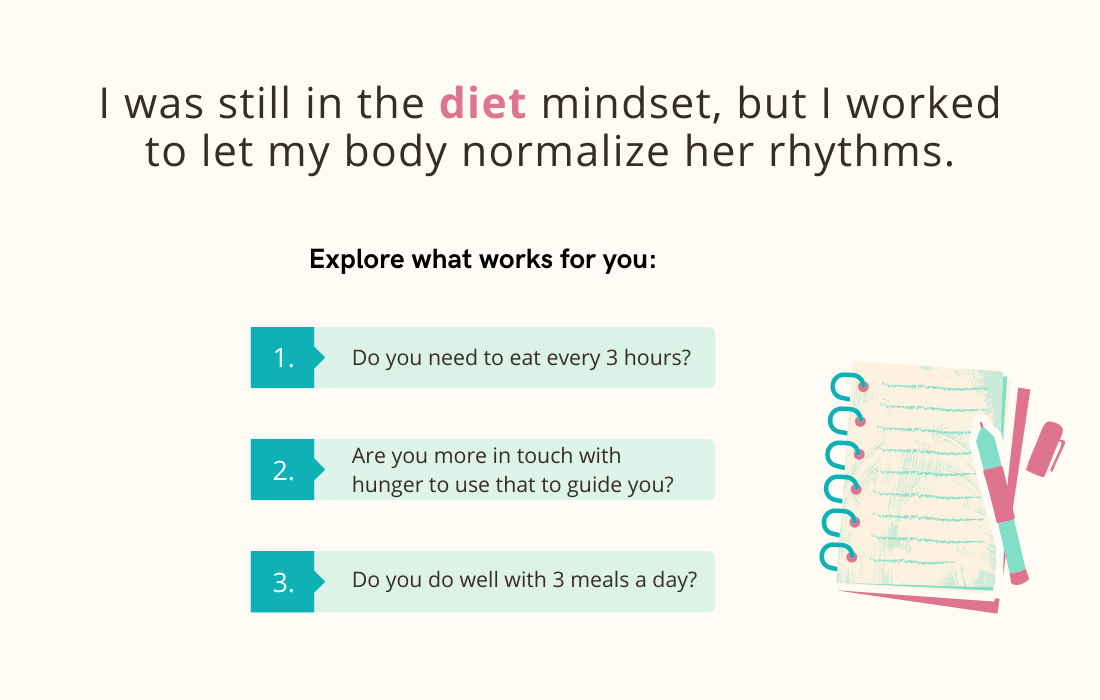
2. I Began Chipping Away at the Old Diet Tapes.
The amount of rules ingrained in my mind around food was astonishing.
- Carbs are bad
- I can’t eat after 7 pm
- Sweets are off limits during the workweek
- I can only have oatmeal or yogurt for breakfast
- Cheese is fattening so don’t eat it
- I have to eat a salad for lunch
That was only the start of my list!
I knew these were hindering my progress, because it only set me up for rebellion.
The more rules I had, the more I ended up rebelling in a binge. So slowly, but surely, I chipped away at the rules. I began with easier ones and worked to expand them.
For example: I had a “I shouldn’t eat bread” hard rule.
Carbs were easier for me than desserts (I binged more on dessert than carbs), so I began with that. I intentionally had a piece of bread with my salad 3x a week for lunch. That felt doable for me–scary (“uh oh, if I eat bread will I gain weight?!) but not so far outside my comfort zone, that it felt terrifying.
I used self-talk and mindfulness to help me “allow” myself to eat the bread.
And I was pleasantly surprised! I didn’t spiral out of control and it didn’t end up in a binge. I actually felt MORE satisfied with my salad when I ate a piece of whole wheat bread with it. That satisfaction helped me not overeat later as I started relaxing my rules.
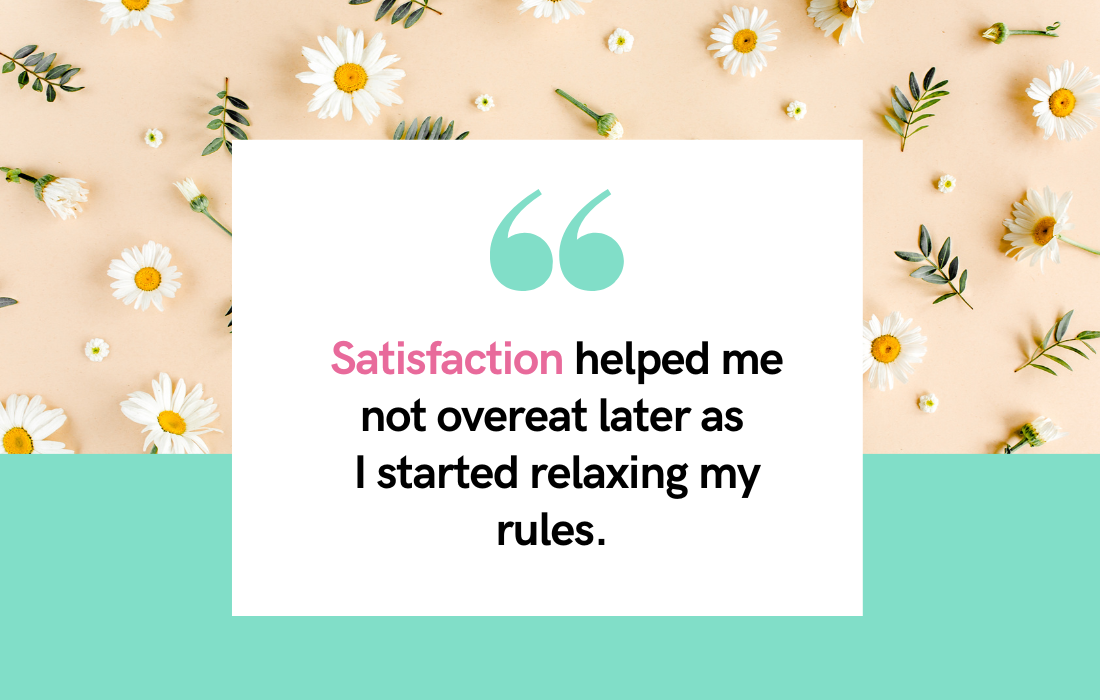
It takes diligence (and of course, it won’t be perfect!) but it can be so helpful to chip away at the old tapes–we often binge in a response to the diet tapes going on in our minds.
What are your diet and food rules?
Begin with a few of the less scary ones to see where you can experiment with relaxing and challenging them. 🙂
3. I Worked to Not Eat Over Every Emotion.
Once I started relaxing my diet tapes and eating more regularly, I realized emotional eating was a big issue for me.
I ate when I was happy, sad, anxious, disappointed, lonely, bored and (insert every other feeling here). A big part of my healing came from exploring my emotions and how they triggered my eating. Every night, I sat with my journal on my couch, writing and exploring what I was stuffing down, hiding from, and avoiding that sent me into the food.
I explored questions like:
- What do I not want to look at?
- What is really bothering me?
- Why am I unhappy?
- What do I really really really want?
- What am I afraid of?
And other bigger life questions.
I wrote and cried and wrote again.
I started meditating and experimented with sitting in the discomfort of silence. And I tried my damnedest to work through emotions that I was terrified to feel. It was not easy. But the payoff was huge. I realized that as I explored emotions more, I ate over them less. I wasn’t an “expert” at feeling my feelings instead of eating, but I did notice that as I shed more tears (that was my only emotional release at first–I didn’t know how else to express anything!), my binges were fewer and farther between.
Take a look at where your emotions send you into the food.
Explore journaling, breathwork, yoga, EFT, and other tools to help you process it rather than eat over it.
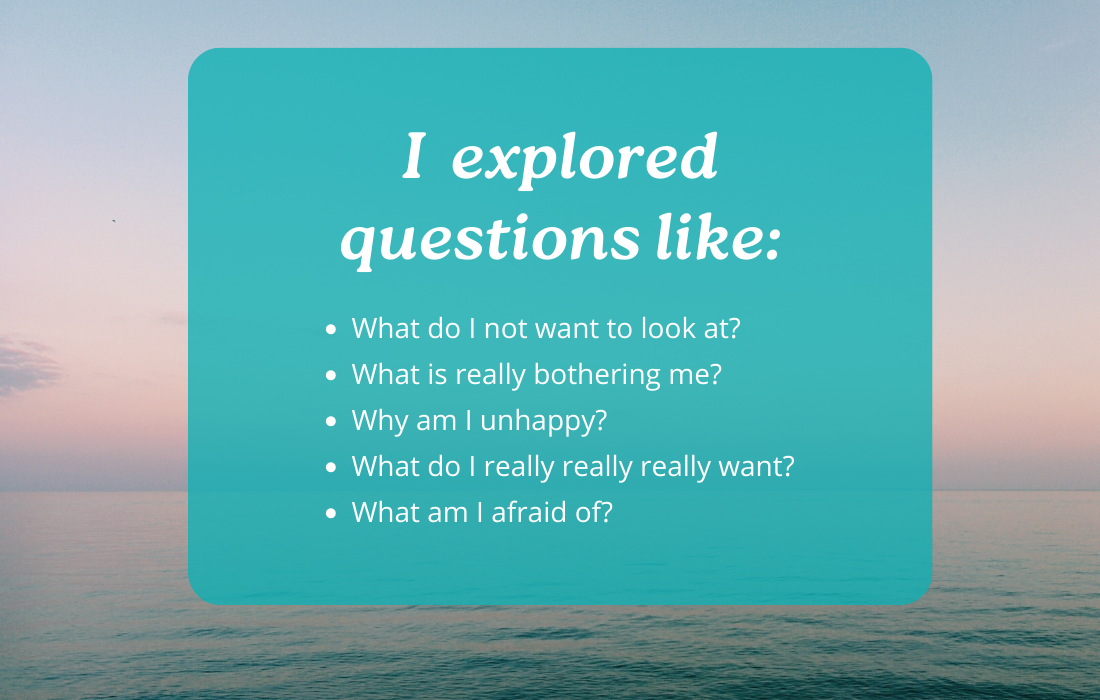
4. I Identified My Triggers & Made a Plan for Them.
One of my biggest triggers was my family. My sister sold Herbalife at the time and it was immensely triggering for me.
She would lose and gain weight and her cycles triggered me. When she did lose weight, I envied her and got tempted to drink shakes instead of eat meals (even though I never would have lasted more than a day!) I had friends who were triggering (they were super thin naturally, had no eating issues and didn’t seem to think about food).
Being out of my routine was also a big trigger.
I felt out of control when I went on vacation, had a social event or was out of town for the weekend. Because these triggers were right now a part of my life (family, friends, etc), I knew I needed to work through them. I wanted to be able to see my sister and not binge or go away for a weekend and come back feeling “normal”.
So I identified all the people, places and things that sent me to the food. And I made a plan for each of them (I did the big triggers, ones I knew were a big deal for me). Before I saw my sister, I would make a plan of what I would do when she made a comment or her weight made me jealous.
Plan:
- Grab my journal and vent my frustrations if I could
- Go for a walk if I wasn’t able to escape to process it
- Vent to my other sister (about how I was feeling…not about blaming my little sister, as I knew triggers were about ME)
- Make sure I got 5-10 minutes by myself every day to feel centered while with family
Other plans were made for a vacation or a weekend away with a boyfriend.
I wrote out responses on index cards to express to my friends how I was feeling if I needed to say why I was triggered/what was wrong. This was SO helpful for me, as I experimented with what would help me take care of myself as I moved through the triggers. (I like to think of triggers as a pointer into where we need to ‘work’ on ourselves…it’s always about OUR own insecurities and fears, reflected back by what someone else is doing or saying).
By coming in with some sort of plan, I felt more prepared to know how to handle my emotions so I didn’t turn to food.
What are your big triggers? Identify them and come up with a 2-4 step plan of what support you’ll need in the moment!
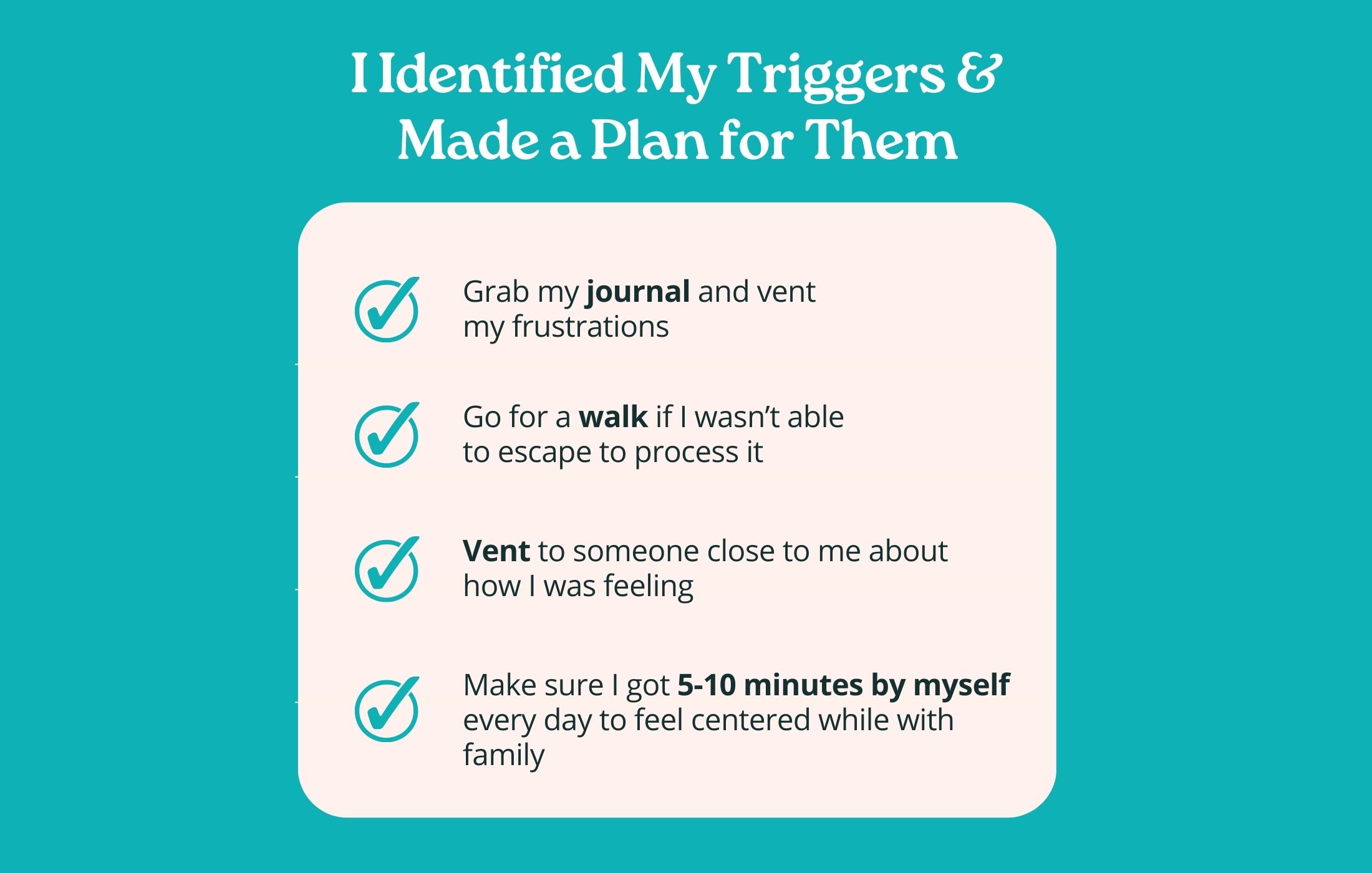
5. I Chipped Away at the All-or-Nothing Mindset.
This was a huge one for me (and one I work on with almost every woman who I coach!)
We think in black and white: we’re either good, we’re adhering to something and doing it perfectly. Or we’ve failed and there’s no point in trying. This either/or mindset is a big stumbling block on the path to healing.
Why? Because inevitably, we are not perfect and life happens.
We planned to eat a salad but go to lunch with a coworker instead. Or we swear we’ll cook dinner every night this week but end up being so tired we order out twice. Our promises to ourselves don’t always happen (especially when a binge is seemingly out of control–we eat over an emotion, we’re rebelling against something, or there is a deeper reason why we turn to food).
Softening the all or nothing mindset into the “gray” area is key on this path.
I did A LOT of self-talk and worked on softening my critical tapes in my mind. (And boy did I have a lot–I had the most negative thoughts about my body, my self-esteem, my worth, my imperfections, everything).
I started by just catching myself when I was thinking this way. I might have been thinking things like “Oh you blew it, you might as well just finish the whole tray of brownies” or “You ate a handful of chips with your lunch, so you ruined the day already.”
I also challenged and talked about it to them,
Yes, it sounded like a lot of different voices in my own mind. 🙂
It required awareness and persistence, but knowing that those thoughts didn’t serve me was a huge inspiration to keep moving forward. I WANTED to feel like I could have a positive, balanced view of how I ate. I hated feeling trapped in the black or white mindset. Slowly but surely, I would challenge those thoughts and they shifted over time.
My favorite mantra was “pretty good is perfect!”
Where does this mindset trip you up? Bring awareness to those thoughts and begin to challenge them! These five steps were immensely helpful in my own “I stopped binge eating” journey.
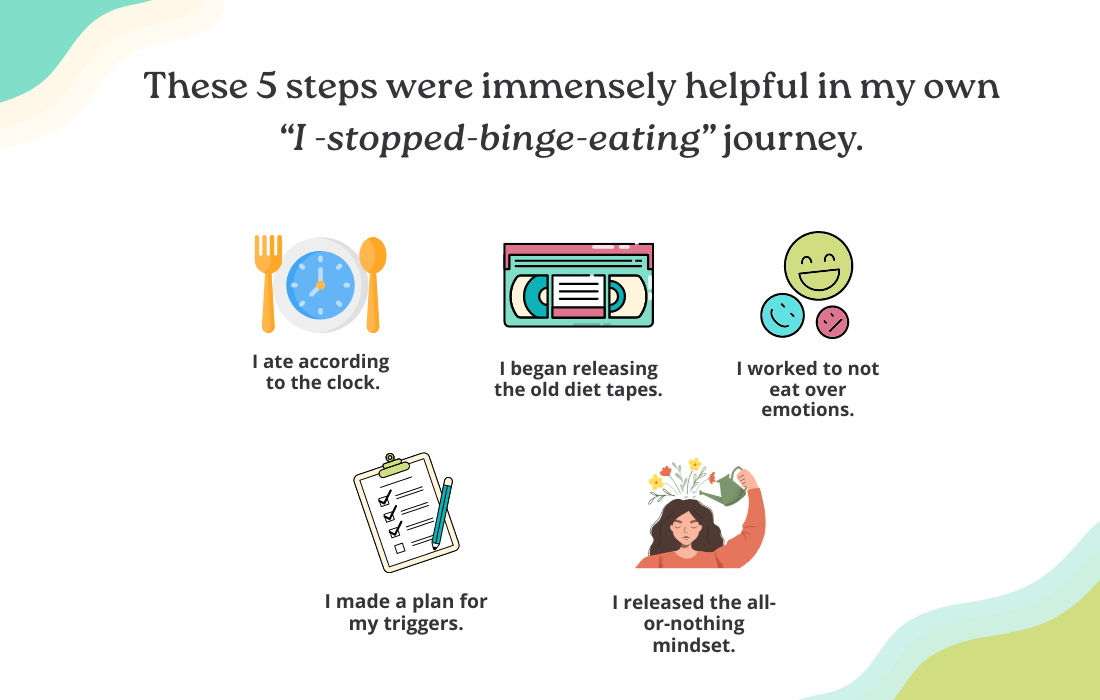
To explore it in a different context, to see how it would look for someone else, meet Jayme:
Jayme came to me, desperate and lost, after having gained 45 pounds during covid. She felt defeated and mortified, that she couldn’t handle this weight gain on her own.
She hadn’t left the house in a while, and was ashamed of her body after gaining so much weight. She wasn’t seeing friends, her family lived in a different country and she said no to almost every social invite. She used to enjoy dancing, but wasn’t doing that either.
“I just can’t stop bingeing,” she confessed to me during our discovery call.
“I know what I’m supposed to do to lose this weight. I know I should be eating healthier foods and moving my body more, but I just can’t seem to stick with anything. And I desperately do not want to diet. I’ve lost weight before on diets but they make me miserable and I can’t stick to anything for very long. I feel lost and am afraid I’ll spiral out of control with my weight if I keep bingeing.”
I understand exactly. The soul crushing frustration of knowing what to do and not being able to do it can break you down.
Food seems easy to “fix”. And we bang our head against the wall trying to do it on our own.
Jayme and I began working together. We started exploring food journaling to look at habits, patterns, and where her sticking points are.
(**many women opt not to do food journaling, as for some it feels very triggering. For Jayme, she wanted to do it to see where her sticking points were during the day).
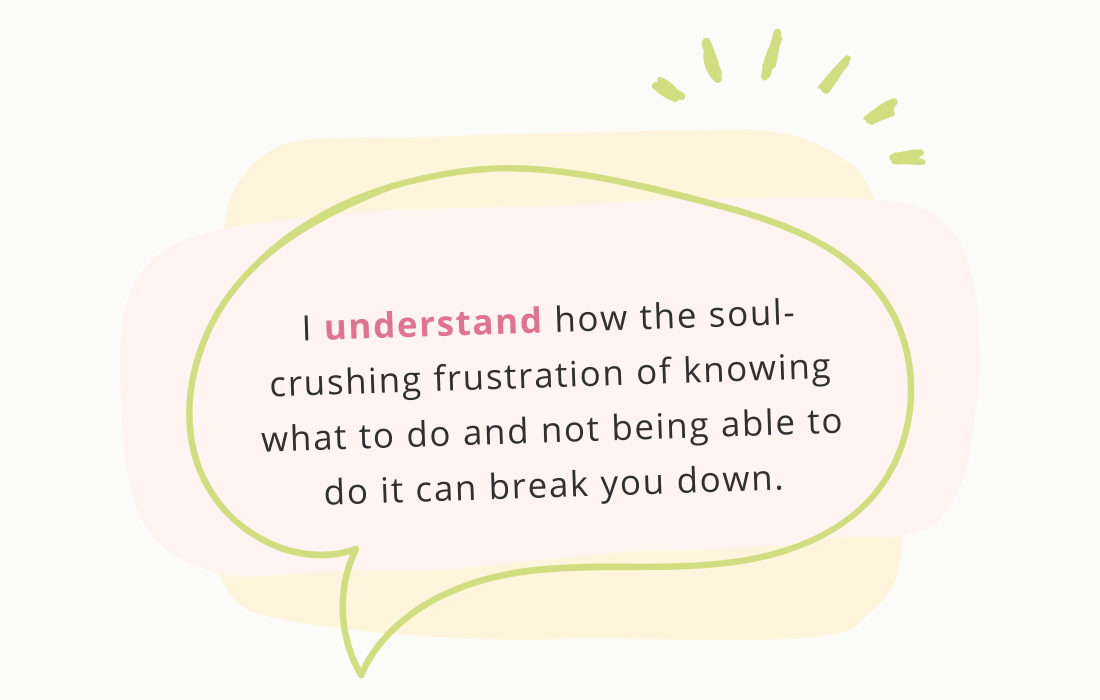
We identified the following patterns:
-
- She was in the “I’ve got to eat super healthy” diet tape during the day, which led to overeating at night
- She was afraid to “allow” any non-healthy foods since she had weight to lose and “shouldn’t” be eating them
- Fullness was super challenging for her to hear in her body.
- Often times, she was eating emotionally over stress and unhappiness with her body.
These were the biggest sticking points for her, so we began there.
We worked to create a better rhythm of eating during the day, so she felt more balanced after dinner and didn’t feel that rebellion from not eating much during the day.
This was a process of experimenting, learning and refining.
Simultaneously, we dove into the balance of allowing vs structure.
She wanted to allow more foods (she had a very long list of “I’m not supposed to eat because I’m overweight”) that we tackled.
We explored adding in foods that she found more satisfying so that she didn’t need to rebel on the weekends (or at night) from eating too many ‘good’ foods. To work on fullness, Jayme started a conversation with her body–she began to look and listen for cues her body gave her when it was full, too full, or approaching full.
She began to discern the subtleties of her body’s signals and continued to deepen the conversation with her body.
Her binges began to subside and she went longer and longer without having a binge. We’d been making steady progress, and then after about 7 weeks, she seemed a bit off during one of our sessions.
“Is everything okay?” I asked her.
She sat quietly for a minute and then her words spilled out.
“I just am not sure if this is working. I had a huge binge the last two nights. I thought I was done with bingeing forever. I haven’t binged in 7 weeks and I’m so angry at myself. What if this never works? What if I never stop bingeing?”
Emotions poured out of her; her angst and despair was tangible.
“I totally get it,” I told her. “This process is not linear. It’s a few steps forward and a half a step back. It’s mind numbingly frustrating at times. It is even more frustrating when you know what to do and just can’t seem to stop it in the moment. When I say “I stopped bingeing”, what I mean is I “let go of it” as it no longer served me. I began to take care of myself and my needs at deeper and deeper levels and no longer needed food as a coping mechanism. This is exactly what you are doing. You’re letting go of food, bit by bit as you no longer need it.”
She paused to reflect on this and we worked through this big block. She was so discouraged at having binged again and she was thinking about giving up.
It took a lot of courage for her to express that to me: she told me after that she wasn’t sure if she should bring it up.
I’m so glad she did because it was a huge turning point for her.
By understanding the ups and downs of this journey in a deeper way, she ended up accelerating her progress.
She really dug deep into why she was doing this work and the next few months were transformational because she did stop bingeing.
Months earlier, she wasn’t sure if she believed she could actually be binge free.
Often times, this path requires blind faith in the process. That spark of hope is so important, as it gets you through to keep going so you CAN move through to the other side!
You Can Stop Binge Eating For Good
When you’re trapped in the diet/binge cycle or feeling like a failure over not being able to stop bingeing, it can feel hopeless that you’ll ever recover.
But I promise you–finding freedom IS possible!
Taking a holistic approach that includes a focus on the physical, mental, emotional and spiritual aspects of yourself will help move you towards lasting change.
How Intuitive Eating Can Help You Stop Overeating
Contrary to popular opinion, the way to stop dieting and feel in control around food isn’t dieting. It’s working towards a more intuitive, mind, body, soul way of eating that uses your body’s wisdom as the guide.
How Do I Know If I Have a Serious Eating Disorder?
If you find yourself obsessively preoccupied with food, trapped in the diet/binge cycle, or being unable to stop overeating, it may indicate an eating disorder. When these behaviors impact your physical and mental health, relationships, or daily life, it may be worth seeking support to recover and heal.
Common Questions
Is binge eating considered an eating disorder?
It depends on the person and the severity of the bingeing. It can be considered an eating disorder for some people, while for others the severity may be less extreme.
What is binge-eating disorder?
Binge-eating disorder is a type of eating disorder marked by frequent episodes of eating large amounts of food rapidly and to the point of discomfort. It’s often accompanied by feelings of guilt or shame.
Does cognitive behavioral therapy work for binge eating?
Cognitive behavioral therapy has been shown to be effective in treating binge eating by targeting the thoughts and behaviors associated with bingeing. There are many ways to overcome binge eating, so explore to find a method that resonates!
Do I need to work with a therapist to try cognitive behavioral therapy for binge eating?
Cognitive behavioral therapy is a wonderful tool, but there are a lot of methods to overcome binge eating. Find a coach or therapist that has a style you resonate with.
Are compulsive overeating and binge eating the same thing?
They are very similar. Compulsive eating is characterized by a compulsion, a force that seems to draw you towards the food and binge eating is consuming a large quantity of food at once (you don’t have to always feel compulsive to binge.)
Can compulsive eating cause health problems?
Long term, compulsive eating can lead to health issues like obesity, diabetes, heart disease, and mental health concerns like depression and anxiety.
What’s the difference between binge eating and emotional eating?
Binge eating is typically consuming large amounts of food while feeling out of control. Emotional eating is using food to cope with emotions like stress, overwhelm, boredom or sadness.
What does “healthy eating” look like?
Healthy eating is a balanced way of eating that works for you and your body. It’s unique to each person but includes a variety of foods that are satisfying and nourishing to the body.
When should I seek help from a healthcare provider?
Explore seeking help from a healthcare provider if you’re experiencing symptoms of an eating disorder, such as frequent binge eating episodes, obsession with food, significant weight changes, or negative impacts on your physical or mental health, relationships, or daily life.
More Articles About Overcoming Binge Eating
⚪ How to Recover from a Binge
⚪ How to Stop Binge Eating at Night
⚪ I Stopped Binge Eating — Here’s How I Did It
Get the Normal Eater’s Newsletter
Join 8000+ women who are overcoming overeating, binge eating, and breaking up with dieting forever. Get Jenn’s inspiring and actionable weekly newsletter with the latest posts, podcasts, and tips on how to love your body, find food freedom, and lose weight holistically.
Get the Normal Eater’s Newsletter
Work with an Emotional Eating & Holistic Nutrition Coach
Overcome Bingeing and Emotional Eating, and Break Up with Yo-yo Dieting
Working with an emotional eating coach and holistic nutritionist can help you get free from the frustrating binge and restrict cycle and stop yo-yo dieting.
You don’t have to be obsessed with food or have a million rules around eating to find your natural weight and learn to love your body. Ready to actually see a lasting change and experience true freedom?
Click HERE to schedule a 20-minute discovery coaching call >
About the Author:
Jenn Hand has been helping women like you become normal eaters since 2015.
She’s worked with thousands of women, helping them to balance their bodies, end bingeing, stop obsessing over food, and start feeling amazing again. As a board-certified health coach and holistic nutritionist, Jenn knows how to support you in making real positive changes that last.
Her articles have been published on Mind Body Green, Tiny Buddha, Thrive Global and other local and global media platforms. She’s the author of How to Be a Normal Eater and the creator of The Normal Eater’s Club program. Listen to Jenn’s advice and tips on the Cake Doesn’t Count Podcast, or read more of her articles for free on the Food Freedom Blog.
Learn more about private coaching with Jenn here >

